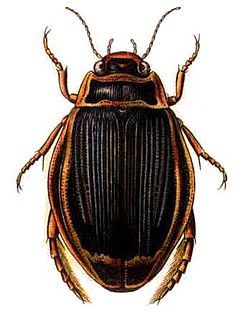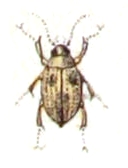Related Research Articles

A water beetle is a generalized name for any beetle that is adapted to living in water at any point in its life cycle. Most water beetles can only live in fresh water, with a few marine species that live in the intertidal zone or littoral zone. There are approximately 2000 species of true water beetles native to lands throughout the world.

The Haliplidae are a family of water beetles who swim using an alternating motion of the legs. They are therefore clumsy in water, and prefer to get around by crawling. The family consists of about 200 species in 5 genera, distributed wherever there is freshwater habitat; it is the only extant member of superfamily Haliploidea. They are also known as crawling water beetles or haliplids.

The Adephaga, with more than 40,000 recorded species in 10 families, are a suborder of highly specialized beetles and the second-largest suborder of the order Coleoptera. Members of this suborder are adephagans, a term which notably include ground beetles, tiger beetles, predacious diving beetles, and whirligig beetles. The majority of the species belongs to the family of carabids, or ground beetles (Carabidae).

Peltodytes is a genus of water beetle which is native to the Nearctic, Europe, the Near East, and North Africa. Peltodytes can generally be differentiated from the similar Haliplus by the presence of a pair of spots on the posterior margin of the pronotum. The genus Peltodytes contains the following species:
Hungerford's crawling water beetle is a critically endangered member of the Haliplidae family of water beetles. The US Fish and Wildlife Service Draft Recovery Plan for the species published August 2004 estimates roughly 1000 individuals are present in the wild. In 2010, a five-year summary report by the United States Fish and Wildlife Service found the population to be essentially unchanged.
Apteraliplus is a genus of crawling water beetles in the family Haliplidae. There is at least one described species in Apteraliplus, A. parvulus, the flightless haliplid beetle.

Brychius is a genus of beetles in the family Haliplidae, containing the following species:
Cretihaliplus is a genus of beetles in the family Haliplidae, containing the following species:

Amphizoa insolens is a species of aquatic beetles. It is found in North America from Alaska to southern California.
Haliplus aliae is a species of water beetle in the genus Haliplus. It can be found in the Palearctic.
Haliplus alluaudi is a species of Haliplidae in the genus Haliplus. It was discovered in 1903. The species lives in the Afro-tropical region.
Haliplus africanus is a species of water beetle in the Haliplidae family. It was discovered by Charles Nicholas Aubé in 1838.

Haliplus mucronatus is a species of Haliplidae in the genus Haliplus. It was discovered by Stephens in 1828.
Peltodytes litoralis is a species of beetle in the genus Peltodytes described in 1912.
Brychius hornii is a species of beetle in the genus Brychius that was first described by George Robert Crotch in 1873.
Brychius pacificus is a species of beetle in the genus Brychius that was discovered in 1928.
Brychius glabratus is a species of beetle in the genus Brychius, discovered by two Villa siblings in 1835.

Brychius elevatus is a species of beetle in the genus Brychius that was first described by Panzer in 1793.
Haliplus robertsi is a species of crawling water beetle in the family Haliplidae.
References
- ↑ Haliplidae Species List Archived 2014-03-28 at the Wayback Machine at Joel Hallan's Biology Catalog. Texas A&M University. Retrieved on 10 May 2012.
- ↑ van Vondel, Bernhard J. (2010). "Revision of the Haliplidae of the Afrotropical region, including North Africa (Coleoptera)". Tijdschrift voor Entomologie. 153 (2): 239–314. doi:10.1163/22119434-900000302.
| This Haliplidae-related article is a stub. You can help Wikipedia by expanding it. |